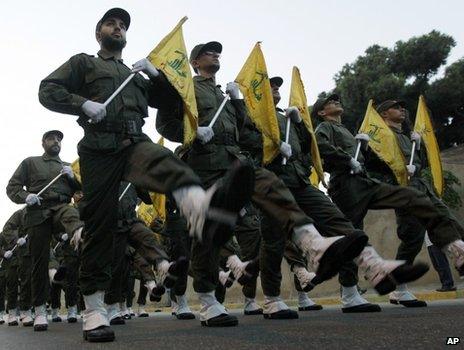Profile: Lebanon's Hezbollah movement
- Published

Hezbollah - the Party of God - is a Shia Islamist political, military and social organisation that wields considerable power in Lebanon.
It emerged with the help of Iran during the Israeli occupation of Lebanon in the early 1980s, though its ideological roots stretch back to the Shia Islamic revival in Lebanon in the 1960s and '70s.
After Israel withdrew in 2000, Hezbollah resisted pressure to disarm and continued to strengthen its military wing, the Islamic Resistance. In some ways, its capabilities now exceed those of the Lebanese army, its considerable firepower used against Israel in the 2006 war.
The group also gradually became a key power broker in Lebanon's political system, and has effectively gained veto power in the cabinet.
Hezbollah has been accused of carrying out a string of bombings and plots against Jewish and Israeli targets and is designated a terrorist organisation by Western states, Israel, Gulf Arab countries and the Arab League.
Some Lebanese consider Hezbollah a threat to the country's stability, but it is enduringly popular within the Shia community.
'Resistance'
Hezbollah's precise origins are difficult to pinpoint, but its precursors emerged following the Israeli invasion of South Lebanon in response to attacks by Palestinian militants in 1982, when Shia leaders favouring a militant response broke away from the leading Amal movement.
The new organisation, Islamic Amal, received considerable military and organisational support from Iran's Revolutionary Guards based in the Bekaa Valley, and emerged as the most prominent and effective of the Shia militias that would later form Hezbollah.
The groups launched attacks on the Israeli military and its ally, the South Lebanon Army (SLA), as well as foreign powers in Lebanon. They are believed to have been behind the bombings of the US embassy and US Marine barracks in 1983, which together left 258 Americans and 58 French servicemen dead, and led Western peacekeeping forces to withdraw.
In 1985, Hezbollah officially announced its establishment by publishing an "open letter" that identified the US and the Soviet Union as Islam's principal enemies and called for the "obliteration" of Israel, which it said was occupying Muslim lands.
It also called for the "adoption of the Islamic system on the basis of free and direct selection of the people, not the basis of forceful imposition".
The 1989 Taif Accord that ended Lebanon's civil war and called for the disarmament of militias prompted Hezbollah to rebrand its military wing as an "Islamic Resistance" force dedicated to ending Israel's occupation, allowing it to keep its weapons.
After the Syrian military imposed peace on Lebanon in 1990, Hezbollah continued its guerrilla war in South Lebanon, but also began to play an active role in Lebanese politics. In 1992, it successfully participated in national elections for the first time.
When Israeli forces finally withdrew in 2000, Hezbollah was credited with pushing them out. The group resisted pressure to disarm and maintained its military presence in the South, claiming as justification the continued Israeli presence in the Shebaa Farms and other disputed areas.
In 2006, Hezbollah militants launched a cross-border attack in which eight Israeli soldiers were killed and two others kidnapped, triggering a massive Israeli response.
Israeli warplanes bombed Hezbollah strongholds in the South and in Beirut's southern suburbs, while Hezbollah fired about 4,000 rockets at Israel. More than 1,125 Lebanese, most of them civilians, died during the 34-day conflict, as well as 119 Israeli soldiers and 45 civilians.
Hezbollah survived the war and emerged emboldened. Although it is has since upgraded and expanded its arsenal and recruited scores of new fighters, there has been no major flare-up along the border area, which is now patrolled by UN peacekeepers and the Lebanese army.
'Political vision'
In 2008, when Lebanon's Western-backed government moved to shut down Hezbollah's private telecommunications network and remove Beirut airport's security chief over ties to the group, Hezbollah responded by seizing much of the capital and fighting rival Sunni groups.
To end the sectarian clashes that left 81 people dead and brought Lebanon to the brink of a new civil war, the government backed down and a power-sharing agreement gave Hezbollah and its allies the power to veto any cabinet decision.
In 2009 elections it won 10 seats in parliament and remained in the unity government.
Later that year, Hezbollah's secretary general Sheikh Hassan Nasrallah issued a new political manifesto that sought to highlight the group's "political vision".
It dropped the reference to an Islamic republic found in the 1985 manifesto, but maintained a tough line against Israel and the US and said Hezbollah needed to keep its weapons.
In 2011, the group and its allies forced the collapse of the unity government led by Saad Hariri, a Saudi-backed Sunni, with Hezbollah warning that it would not stand by as four of its members were accused of involvement in the 2005 assassination of Mr Hariri's father Rafik.
Hezbollah and its allies have continued to be part of subsequent governments, where they wield considerable influence.
As the war in Syria escalated, thousands of Hezbollah militants went to fight for Syrian President Bashar al-Assad, proving decisive in helping pro-government forces recover ground lost to rebels, particularly along the Lebanese border.
Hezbollah's involvement in Syria, however, has sharpened sectarian tensions in Lebanon, where the group has been targeted in a series of bombings by Sunni militants.
Its support for Syria's Shia Alawite president and alliance with Iran has also seen a deepening of hostility from Gulf Arab states, led by Iran's main regional rival, Saudi Arabia.
In early 2016, Saudi Arabia led Gulf countries and the Arab League to declare Hezbollah a terrorist group, accusing it of "hostile acts".